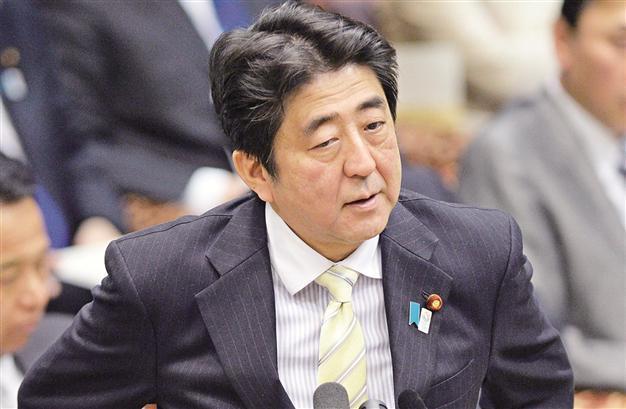China-Japan ties tested with ‘visits’
TOKYO / BEIJING

Japanese Prime Minister Shinzo Abe answers a question at a session. Abe vowed to ‘expel by force’ any Chinese landing on the islands at the center of a territorial row, after eight Chinese vessels sailed into disputed waters.AFP photo
Tensions between Japan and China have flared up anew after a group of Japanese lawmakers visited a shrine seen by Asian neighbors as a symbol of Japan’s past militarism, as Chinese patrol vessels played cat-and-mouse with Japanese nationalists near disputed islands in the East China Sea.China chastised Japan for yesterday’s visits by at least 168 lawmakers to Tokyo’s Yasukuni Shrine, which honors 14 leaders convicted as war criminals by an Allied tribunal along with Japan’s war dead.
The mass pilgrimage came after Prime Minister Shinzo Abe made an offering and Deputy Prime Minister Taro Aso and two other ministers visited Yasukuni over the weekend.
Homage paid by leading Japanese politicians at the Tokyo shrine typically angers Japan’s neighbors, who contend that it glorifies wartime atrocities.
“Tuesday’s mass visit to Yasukuni ... will definitely further weigh on already strained ties between Japan and its key Asian neighbors,” said China’s Xinhua news agency. “Japanese politicians ... should remember that only when Japan faces up to its notorious aggressive past can it embrace a bright future.”
Japan, for its part, summoned the Chinese ambassador in protest over a flotilla of Chinese government ships that entered territorial waters near a disputed island chain, known as the Senkaku in Japan and the Diaoyu in China. Abe vowed to “expel by force” any Chinese landing on the islands in the East China Sea and promised “decisive action.”
‘History should be kept apart’
“We would never allow a landing,” Abe told Parliament in response to questions from lawmakers, adding: “It would be natural for us to expel by force if [the Chinese] were to make a landing.” But Tokyo appeared keen to avoid a clash between the flotilla of 10 boats carrying about 80 nationalist activists and the Chinese ships. Japan’s Coast Guard, which had 13 vessels shadowing the boats, urged them to leave and escorted them away.
Last year, members of the same group, “Ganbare Nippon” (Stand Firm! Japan), landed on one of the disputed islets and triggered anti-Japanese protests in China, where lingering resentment over Japan’s wartime aggression has been rekindled in recent days. South Korea, where bitter memories of Japan’s 1910-1945 colonization run deep, has also canceled a trip to Japan by its foreign minister following the weekend shrine visits.
On April 23, a South Korean Foreign Ministry spokesman said matters of history should be kept separate from efforts to cooperate over unpredictable North Korea’s nuclear ambitions.
“It is helpful that the region’s countries and the international community work together and pool their wisdom to solve this problem. But when it comes to history issues like the Yasukuni visit, our government takes a firm stance. That must not be mixed,” said Cho Tae-young in Seoul.
Conservatives in Japan argue they should be able to pay their respects to the nation’s war dead in their own way, and for many, the ideological stance trumps diplomatic concerns.
















